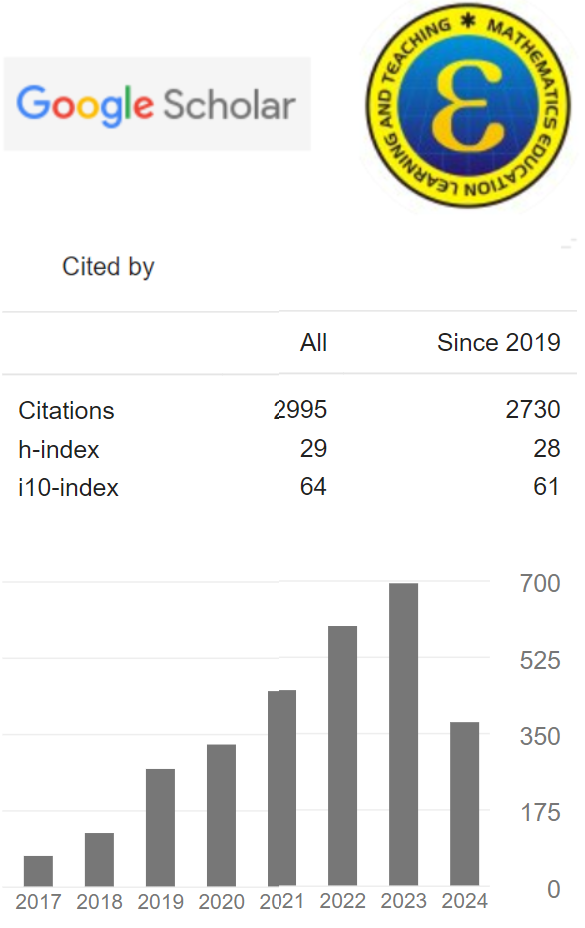Focus and Scope
Aims:
EduMa: Learning and Teaching Mathematics Education aims to facilitate researchers and educators by providing a platform to disseminate scholarly research, contribute to developing knowledge and teaching practices for the advancement of mathematics education.
Focus:
EduMa is dedicated to publishing cutting-edge research in mathematics education, focusing on student learning, innovative use of media and multimedia, effective didactic designs, curriculum development, assessment methods, teacher professional development, and practical applications of mathematics. Special emphasis is placed on the context of Indonesia and Southeast Asia, addressing region-specific challenges, solutions, and best practices to inspire educators and researchers globally.
Scope:
The scope of articles that can be submitted to EduMa: Learning and Teaching Mathematics Education covers various topics in the field of mathematics education, including but not limited to:
- Research on effective mathematics teaching and learning strategies.
- Development of mathematics teaching materials and resources
- Development and evaluation of the mathematics education curriculum
- Application of statistical methods in mathematics education research
- Technological innovation and multimedia learning in mathematics.
- Assessment and evaluation tools to measure mathematics learning outcomes
- Study of professional development in mathematics education
- Practical application of mathematics in various contexts
Section Policies
Articles
Peer Review Process
Peer Review Process
Desk Evaluation: A designated editor will conduct an initial review of the submitted manuscript. This review will assess whether the manuscript aligns with the focus and scope of the EduMa journal and whether it exhibits any significant methodological weaknesses. Additionally, similarity scores will be checked using Turnitin to ensure originality.
Expert Review: The editorial team will select at least two anonymous expert referees who specialize in the subject matter. These experts will evaluate the manuscript's contribution, originality, relevance, and presentation. This process follows a "blind peer review" system to maintain anonymity.
Author Response: Following the reviews, the author will receive feedback and suggestions from the reviewers. The author should address these comments and make necessary revisions.
Editorial Evaluation: The editorial team convenes in editorial board meetings to assess the reviewers' recommendations and decide on the final publication status of the manuscript. The Editor will then communicate the final decision to the corresponding author.
Review Outcomes
Utilizing the feedback obtained through the peer review process, the Editor will make a final publication decision. The review process typically spans 4 to 8 weeks. The potential decision categories are as follows:
Reject - Manuscripts deemed unsuitable for publication will not be published, and authors will not have the opportunity to resubmit the revised version to EduMa journal.
Resubmit for Review - Authors are encouraged to rework their submission, and if significant changes are made, the manuscript may be accepted. However, it will require a second round of review.
Accept with Revisions - Manuscripts receiving an "accept-pending-revisions" decision will be published in EduMa journal provided that minor/major modifications are made. An editor will review the revisions to ensure that necessary updates are incorporated prior to publication.
Accept - Manuscripts that meet the journal's standards will be published in their current form without further modifications.
Author Communication
All correspondence related to the manuscript should be directed to the Editor of EduMa journal and copied to eduma.iaincrb@gmail.com. The Editor will oversee all communication with the lead author, who is responsible for disseminating information to the co-authors. Beyond communication during the review process, manuscripts accepted for publication may necessitate additional correspondence for copyediting and layout editing.
After Acceptance
Following acceptance, a proofreader will thoroughly examine the accepted manuscript to ensure it meets the publication's final standards.
Open Access Policy
EduMa: Learning and Teaching Mathematics Education complies with I4OC standards for open citations. This journal provides immediate open access to its content on the principle that making research freely available to the public supports a greater global knowledge exchange.
Archiving
Digital Archiving Policy
EduMa Journal has electronic backup and preservation of access to content of its journals via PKP Preservation Network (PKP PN). This can be seen at Publisher Manifest.
PKP has developed the PKP Preservation Network (PKP PN) to digitally preserve OJS journals. The LOCKSS program offers decentralized and distributed preservation, seamless perpetual access, and preservation of the authentic original version of the content. The PKP PN ensures that journals that are not part of any other digital preservation service (such as CLOCKSS or Portico) can be preserved for long-term access. For additional details about the PKP PN, Please kindly see the high-level overview (an early discussion document).
In addition, this journal is also archived at the national library, namely the Indonesian One Search, the Garba Rujukan Digital (Garuda), and the Science and Technology Index (SINTA).


.png)











